![]()
![]()
![]()
![]()
![]()
![]()
![]()
![]()
![]()
![]()
![]()
![]()
![]()
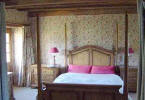
This is a
magnificent Manor House dating from the 17th century full of character as well
as elegance after careful and tasteful renovation. The house formerly belonged
to Chateau de Beynac and is located less than 10 minutes drive from Sarlat – the
pearl of Dordogne - with its picturesque cobbled-stoned streets, ancient houses
and lively Saturday market. Yet, the house is in a quiet country side setting
surrounded by its own 10 hectares of land where you can spot both deer and
eagles. A wonderful place to relax and an ideal base for exploring the Dordogne
and Vezere Valleys.
Accommodation: The spacious house (550 m2) can accommodate up to 14
people and is exquisitely furnished throughout with Asian antique furniture and
arts and crafts which presents a fascinating mixture of rustic country side
atmosphere and sophisticated luxury. There is a large swimming pool on the
grounds, measuring 12 x 6 m, and plenty of nice hardwood garden furniture and
sun loungers from which to enjoy the beautiful pool area. There is a large
salon/living room (100 m2) with wooden beamed ceiling and two grand open stone
fireplaces – one at each end of the room. The room has three comfortable sitting
groups and a piano which is at the musical guests’ disposal. An oak staircase
will take you to the upper floor where you will find three (3) bedrooms, all
with beamed ceilings. Arabian nights: a bedroom in yellow and gold that features
a double bed (180 cm), a sitting group and stairs leading up to the spacious
bathroom with an antique toilet-table and its own Jacuzzi.
The Pink Pasha’s Retreat: a cosy French country style room in pastel colours
with a 140 cm double bed, its own WC and shower cabin. The Dream of the Red
Mansion: a stylish bedroom decorated with Chinese antique furniture and arts and
crafts with a double bed (180 cm) and a spacious bathroom with WC, bathtub, and
two basins and lovely views over the grounds. If you instead take the teak
staircase down from the living room you end up in: The billiards room which
features an art gallery with Vietnamese oil-paintings, a full-size pool table
and a darts board. Here you will also find bedroom 4. The Bedouin’s Bungalow: a
spacious, cosy bedroom with two twin beds (100 cm each) and a large Chinese
antique sofa that can be made into a third canopy-style bed. The room has its
own WC and bathtub and its own entrance from the garden. If you turn left as you
enter the house’s entree, you will come into:The dining room which has a beamed
ceiling, a large open stone fire place and a rustic wooden dining table that can
seat 12 people. This room has windows and doors on each side, one leading out to
a large barbecue terrace where you can catch the afternoon and evening sun. The
dining room also has doors leading to the kitchen. A large country style kitchen
with all modern equipment: gas stove that also has an electric heating plate,
electric oven, microwave oven, two dish washers, fridge and freezer with
ice-making machine and plenty of “workspace” to prepare and cook the delicacies
of the region. From the dining room there is also a stair taking you to two more
bedrooms:The Jade Palace: in gentle green colours, beamed ceiling, a 160cm
double canopy bed and a spacious bathroom in what is the “tower” of the manor.
The bathroom has hand painted wash basins and WC and features its own Jacuzzi.
Ming Dynasty: a bedroom in light blue tones with 2 single beds (120cm and 100cm)
decorated with blue and white China, antique paintings and a bathroom with its
own bathtub and hand-painted wash basin and WC. If you go through the dining
room and past the kitchen you will enter the private suite called The Sultan’s
Suite: The Sultan’s Suite consists of a private library style salon with a
sit-group, TV with satellite, and an open fireplace. The bedroom has a 160 cm
Spanish four poster double bed, country style Laura Ashley wall paper and a
spacious bathroom with a large bathtub, separate WC and walk-in wardrobe. Behind
the Sultan’s suite there is a laundry room with washing machine and dryer.
Excursions in the region: Dordogne and Vezere Valleys: The valleys around
the Dordogne and Vezere rivers is a paradise for visitors of all kinds: it is a
haven for culture lovers as the valleys are dotted with hilltop castles and
pre-historic caves. Gourmands love it too since Perigord has some of the finest
dining and wining in France and also there is plenty to do for those of you
enjoying an active holiday with canoeing, kayaking, fishing, rock climbing,
horse riding or cycling. For the nature lover, the amazing scenery from the top
of a hill, the intensity of the greenery and the picturesque stone houses along
the curvy country roads will capture your heat at first glance.
Caves and Pre-historic Sites
Lascaux caves: The Lascaux caves, adorned with some of the most extraordinary
prehistoring paintings ever discovered, are probably the most famous of the
region. It was discovered in 1940 by four teenage boys who were out searching
for their dog. The cave’s main room and a number of steep galleries are
decorated with figures of wild oxen, deer, horses, reindeer and other creatures
depicted in vivid reds, blacks, yellows and browns. A replica (Lacaux II) of
this cave is what you are seeing since the human breath were causing a green
fungus and tiny stalactites to grow over the paintings and their colours fade as
a result.
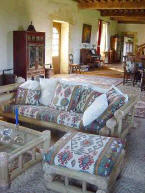
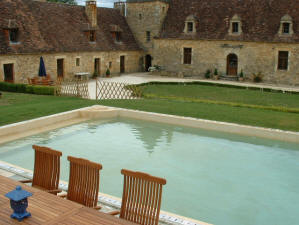
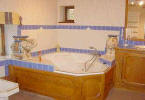
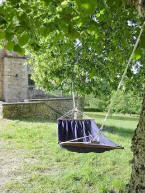
Towns and
Villages: Sarlat (4 km): Nestling in a small valley between the Dordogne and
Vezere rivers, Sarlat is considered the “gem” of Dordogne with its amazingly
beautiful golden-stone houses and ancient roofs along its medieval, cobbled
stone streets. Sarlat is the European town offering the greatest number of
Historical Monuments per square kilometre and has often been used for film
settings. In additional to its cultural heritage, this part of Perigord offers
among the finest gastronomy in France. Boutiques are filled with truffle, foie
gras (goose liver), confits de Canard, pates and other delicatessen. A good time
to sample the tastes and smells of these famous produce of the region is on its
lively Saturday market where you can also buy other items from the region such
as handicraft, textile, antiques or just a souvenir.
La Roque-Gageac (15 km): Huddled beneath a towering grey cliff, this village of
tan stone houses, is just on the right bank of one of the hairpin curves in the
Dordogne River. It is one of the best-restored villages in the Dordogne Valley
and is very popular with artists trying to catch its beauty. Crafts shops line
its low, narrow streets, dominated by the outlines of the 19th-century
mock-medieval Chateau de Malartrie and the Manoir de Tarde, with its cylindrical
turret. You will also find a number of cave dwellings knows as the Fort
Troglodyte.
Beynac (11 km): Beynac is most famous for its impressive Chateau that you can
see already from afar as it is located high on the top of a cliff above the
Dordogne river. This was once one of the greatest Perigord strongholds,
dominating a strategic bend in the Dordogne and rivaling the fortress at
Castelnaud on the other bank of the river. In the village, there is a small
folklore museum and, behind the castle, an open-air “Parc Archaelolgique”
containing a series of reconstructed Neolithic dwellings and tools. Also, the
neighbouring hilltop hamlet of Cazenac is worth a visit for its Gothic church
and exceptional views.